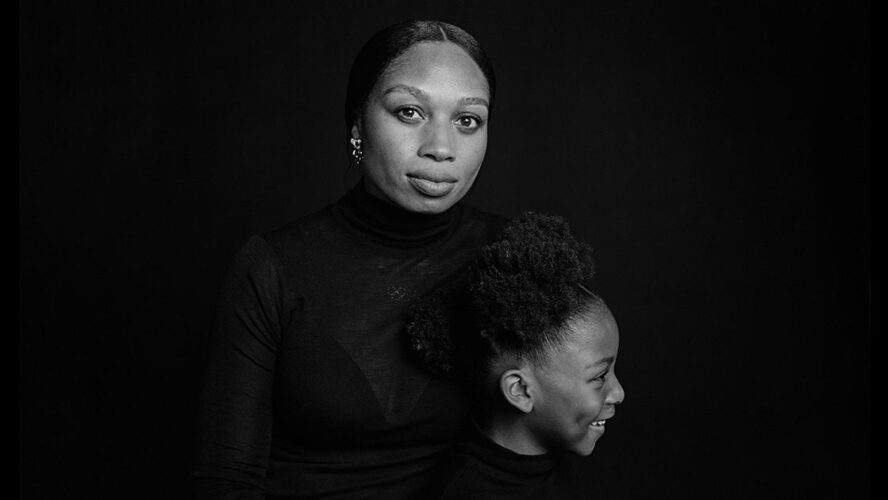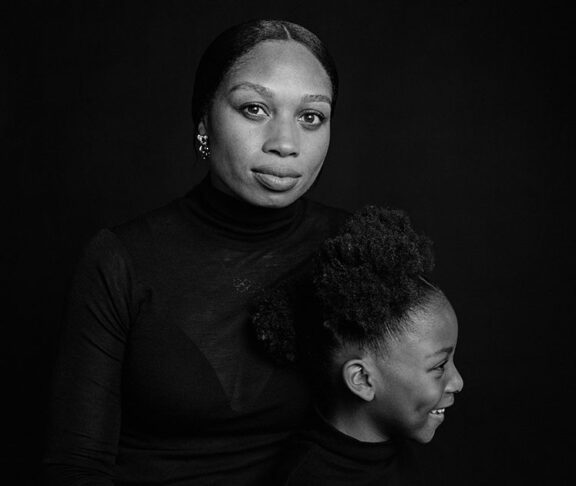Olympic legend and entrepreneur Allyson Felix discusses the importance of flexibility, empathy, and culture for supporting working mothers in the modern workplace.
As both an elite athlete and entrepreneur, how do you think employers can better support working mothers in balancing career and family?
I think it really starts with the culture of both and creating an environment where mothers don’t feel like they have to choose. I think it’s about getting outside of the traditional model and being more flexible, whether that’s offering remote work options or on-site childcare. How can we show up and support them so they can do the work they love and really contribute in a passionate way?
What policies have been most helpful to you as a working mom building a business?
For me, it really has been the flexibility to be in leadership and to normalize being a parent, whether that is stepping out to breastfeed my son, traveling with my kids, or being transparent with our teams that, for example, my daughter has a baseball game, so I’m not going to be here. I’m still doing all the work, but I’m integrating family life as well. I think we need more of that, where women don’t feel penalized for having families, but rather feel like we can embrace it, and it’s part of our full identity. Just the flexibility of working at home, coming into the office, and traveling has been huge. Also, at my company, when I had my son, having parental leave and being able to really take that. When I was still competing, that wasn’t possible. To fully say, “I’m stepping away and I’m going to take this time with my child,” was really great.
From your experience, what makes a workplace truly supportive for mothers?
I think it goes back to culture. I get to talk to a lot of women who are in a similar situation as I was in previously, where they hid pregnancies or waited until the last moment to tell their employers. It was this feeling of, “I’m not going to be able to do this, or I’m going to be looked at differently, or taken off certain things.” We have to change that. I think it’s something that is happening, but it takes time.
One thing that makes it feel supportive is lactation spaces. I remember pumping in many bathrooms and stadiums — spaces not set up for moms — and figuring out what to do with your milk. What’s important is feeling like people have empathy for you, and that you still can show up as yourself with your family.
How has motherhood shaped your leadership style and approach to building inclusive, family-friendly workplaces?
Early in my athletic career, I had a couple of friends who had children, and I just didn’t understand what they were going through. I think it’s something you have to experience to have empathy. There’s so much responsibility with it. Having gone through it multiple times now, I can be more intentional, have more empathy, and lead with greater awareness. I want the company I’m building to reflect that. I don’t want anyone to feel like they have to hide their parenthood or feel like it’s a liability; it adds to the richness of the work we’re doing. From the top, we need to build spaces where it’s celebrated instead of just tolerated. I think COVID did that, too; it normalized that we’re all doing so much, and we need to embrace that more and have those conversations. It shouldn’t be such a hidden thing.
What advice do you have for women navigating early motherhood and demanding careers?
Give yourself grace. It’s something I had to learn. I remember when I was pregnant with my daughter, I looked at other women who had been in the same scenario. One athlete in particular, Alysia Montaño, came back and did really amazing six months postpartum. She didn’t miss a beat. I thought, that’s the path I’m going to follow. That was not my experience.
I gave birth two months early and had an emergency C-section, so it wasn’t my reality. Sometimes we have to step back and understand that we’re each on our own unique journey. This expectation of getting back to it all, just do away with that. Say, “This is my new experience, and I’m going to gradually do the things I love in this new way.” More than anything, just give yourself grace and understand that becoming a mother adds to your identity. There’s more on the plate and more to navigate.
Can you share a little bit about your own maternal health experience and why you’ve done such amazing advocacy work in this space?
I gave birth to my daughter at 32 weeks. I had what I thought was a healthy pregnancy. I was still competing, training, and felt strong, but at 32 weeks, everything changed. I was diagnosed with a severe case of preeclampsia and gave birth via emergency C-section. It shook up my world. My daughter was in the NICU for a month. It was a really challenging experience for me and my family. It was also eye-opening. Somewhere in the back of my mind, I had heard statistics about women of color and giving birth, but I had no up-close experience. I had taken my health for granted and never imagined myself in that situation.
Learning how preventable so much of it is, that moved me. When we made it out of the hospital and brought our daughter home, it was like, how can we be part of the solution? I didn’t know what that looked like, but I knew I wanted to do something. I was so grateful that my daughter survived and our family was together. From what I’ve learned, that outcome is rare. It was that experience that opened my eyes and made me want to get involved.
What message do you want to share with women, especially women of color, about advocating for their own health during pregnancy and postpartum?
The biggest thing is that they should be prepared to do so. That’s not something that was on my radar at all. Frankly, it shouldn’t have to be, but it is the reality for women of color in America. You need to know right away that you’re at risk for complications, that you’re at risk of dying during childbirth. It’s a hard conversation to have around birthing — an experience that should be joyful — but it’s the reality. When you go to give birth, you need to be prepared to ask questions, not to be intimidated in a doctor’s office, to have another advocate, someone who can be your voice if you’re not able to and if decisions need to be made. Awareness around what you’re up against is critical.
What should employers know about maternal health and some of the risks, especially those that women of color face?
Employers should be aware of the risks and complications. A lot of times, when people think about parental leave, they assume everything will go perfectly. However, there are many cases where you have extended hospital stays. You may not be coming home with a baby. I have a dear friend who had a stillbirth, and she wasn’t considered to be on leave because she didn’t have a baby. In these heartbreaking situations, employers need to understand how to support someone coming back to work after a loss like that. Be mindful and thoughtful. Understand this is a crisis happening in America.
What progress have you seen in the conversation around maternal health since you began speaking out, and what still needs to be done?
There’s definitely more visibility. We’re having the conversation in the mainstream. People are much more informed. But we can’t stop there. We need policy changes, systematic change, training for healthcare providers, and accountability for outcomes. I’m seeing more of that now. When things go wrong, there’s more awareness of what action needs to be taken. However, we need to continue the work and focus on solutions. Over 80% of complications and deaths around maternal health for women of color are preventable. We need to put investment behind research so we can have greater solutions.
Any final thoughts on motherhood and work?
I think the point is choice. Everyone’s journey looks different. If you choose to be a mother, if you have a challenging road, or if you choose not to, it’s ultimately about showing up as your full self. As employers, we need to be able to support that. At the end of the day, we want to do meaningful work, and we also want to live fulfilling lives, which includes our identity as mothers. Being mindful and thoughtful on both sides really leads to change and a shift in culture.


